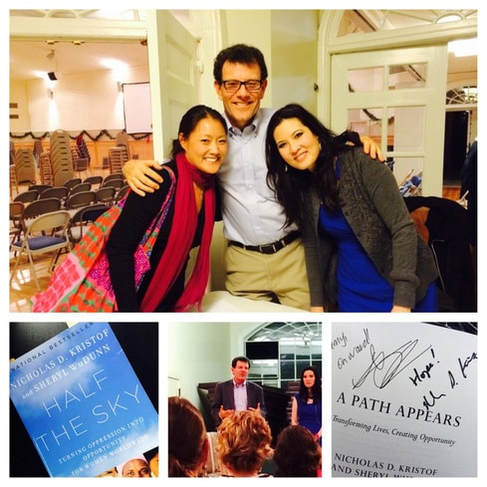|
I hate the word “hero”.
A hero is perfect. A hero must do the right things at all times. A hero is infallible. Modern humanitarians I’ve admired like Somaly Mam or Greg Mortensen were elevated to superhuman hero status one day, then branded as “fallen heroes” the next, after proving capable of human fallibility (even gross misjudgment); while the work they did to empower vulnerable girls - which is what was truly heroic - was tragically forgotten. So, I pause before using the word “heroes” when describing Nicolas Kristof and Sheryl WuDunn and my brief yet inspiring interaction with them in Berkeley last night. But I’m jumping ahead. Let me back up. It was around 2010. I bought Half the Sky at an airport bookshop. “Turning Oppression into Opportunity for Women Worldwide,” the blue cover said. Back in those days, I was still working in finance. My head was full of forecast figures and corporate ambition. I opted for some lighter David Sedaris humor. The book sat on my shelf and collected dust. Fast forward to early 2012. I had just quit my corporate job the year before, on the back of reconnecting with my biological Korean family, discovering I had been kidnapped at birth to an orphanage, and that my Korean mom was orphaned by the North Korean army who killed her parents when she was six. I mentioned my story to a friend, how I was planting the seeds of the Global Gratitude Alliance with my co-founders, and how our mission was to empower women and children. “You have to read Half the Sky,” she insisted. I dusted off the blue book cover and spent the next two days on the couch in my pajamas until I finished it. I’ve since read it several more times, marking it up with post-its and highlighters. I reference it often in my grad school global studies courses. What inspired me so much about this book was what the research brought to life. The stories of real people who have survived sex trafficking, community-prescribed gang rape, and extreme poverty only to come out on the other side to give back, empower others, and create new legacies for their communities. Like Tererai Trent from Zimbabwe, married off at age 11 to become a poor cow herder and survivor of domestic abuse, but with a dream to get an education. With the assistance of Heifer International, she has since earned her undergrad, masters, and Ph.D. in the U.S. Today, through her foundation called Tonogona (Shona, for “it is possible”) she’s building schools, giving the gift of possibility to other Zimbabwean children. These stories affirmed not only our focus on women and children, but also our approach of working at the grassroots level - partnering with locals who already know what their communities need. I noted the story about female genital mutilation, and how cutting was a better term to use when talking to communities who might otherwise feel judged by paternalistic outsiders. I vowed to only apply culturally informed and community-led approaches in our work. And the Senegalese men who felt angry and disempowered when aid workers came to their village to talk only to the women about their rights. They needed to be included in conversations and as part of the solution. I remembered what Jacqueline Novogratz said in a TED talk: “…the girls and women are most isolated and violated and victimized… in those very societies where our men and boys feel disempowered…” And so, we include leadership programs and mentoring for adolescent boys and young men in our scope as well, preventing another generation of child soldiers, gender-based violence, and inequality. I’m now reading the latest Kristof / WuDunn book, A Path Appears. The chapter on the neuroscience of giving speaks directly to our core message: giving with gratitude, not guilt, is good for our own health and wellbeing and can empower ripples of change around the world. Seeing these two incredible writers, researchers, and humanitarians speak live in Berkeley last night was surreal. Getting a chance to thank them in person, if only briefly, for the inspiration, guidance, and affirmation of our work with women and children – and my life’s purpose – was exhilarating. And, having my humanitarian friend, Ann Dretzka, take a photo of us together will be proof that this really did happen when my brain later tries to trick me into thinking it was just a hallucination (perhaps from overeating eggplant curry just before their lecture). I still feel funny about the awkward, apologetic exchange of my business card during the book signing. “Errrrr, here is my card…” But, I’m just going to let that one go. Because at the end of the day, we are all just humans – even imperfect ones – trying to do our best for the world.
0 Comments
Leave a Reply. |
|
© Copyright 2023
|

 RSS Feed
RSS Feed